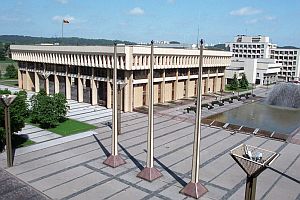Analytics, Budget, Financial Services, GDP, Legislation, Lithuania
International Internet Magazine. Baltic States news & analytics
Wednesday, 14.05.2025, 10:11
Money flows into the state institutions in Lithuania
 Print version
Print version |
|---|
Growing expenditure of ministries was at first explained by Lithuania's Presidency of the EU Council or the Constitutional Court's decision allowing to reinstate some salaries cut during the economic crisis. Although Presidency events have already ended, officials continue to spend.
Even President Dalia Grybauskaite, who always talks about saving, has allowed to loosen belts – the projected budget of the President's Office will grow next year by more than LTL 300,000 (EUR 87,000).
The Seimas' Opposition is not lacking great ideas, for example, to increase defence spending to 2% of GDP as soon as possible, but at the same time to have a non-deficit state budget; to double tax-exempt income of parents who raise children to LTL 400 (EUR 115) per child; to revoke the reduced VAT rate on heating and hot water so that "millionaires" living in blocks of flats would not take advantage of the situation. A question arises why the Conservatives and the Liberals did not implement all of these goals during their term in government in 2008-2012? Perhaps because such steps made by any government would mean failure in the next elections.
The daily Vakaro Zinios interviewed political scientist Professor of Vytautas Magnus University Algis Krupavicius over why the Coalition is raked over the coals by the Opposition every time it gets a chance.
"Actually, the Opposition seems to be hibernating in the middle of the term, whereas now it is the right time to be noticed. It is also odd that the Opposition is not involved in a serious discussion over the state budget of 2015 which is under deliberation. It could be discussed whether the budget is optimistic or pessimistic, whereas its assessment is only superficial. The Opposition does not even offer proposals how to form the budget more rationally. This might have adverse consequences for the Opposition, it might lose voter confidence and the support for the ruling parties might grow slightly," said political scientist Algis Krupavicius.








 «The Baltic Course» Is Sold and Stays in Business!
«The Baltic Course» Is Sold and Stays in Business!

